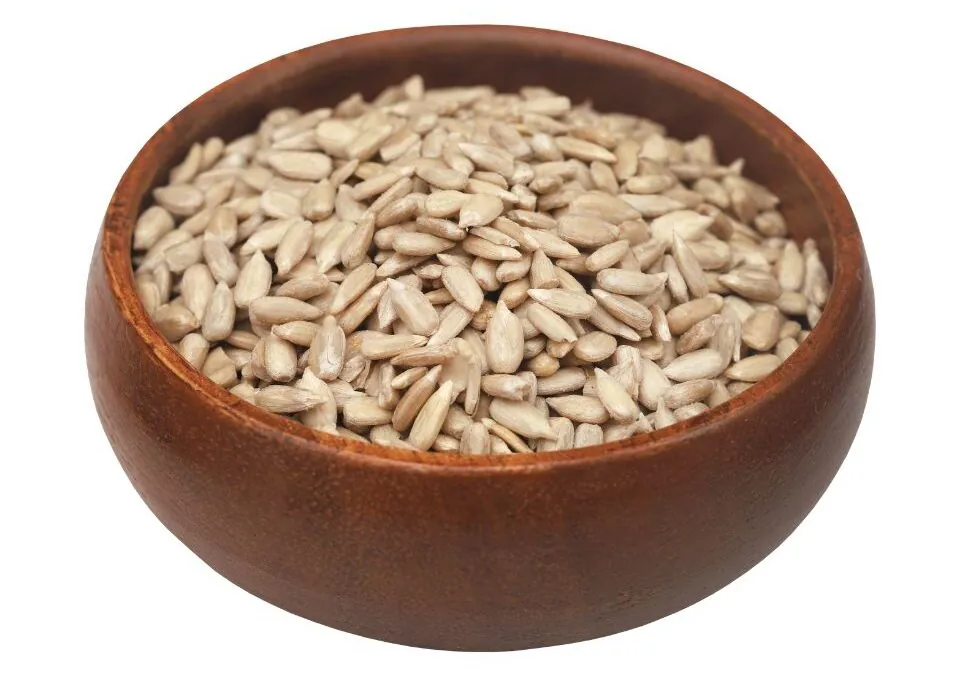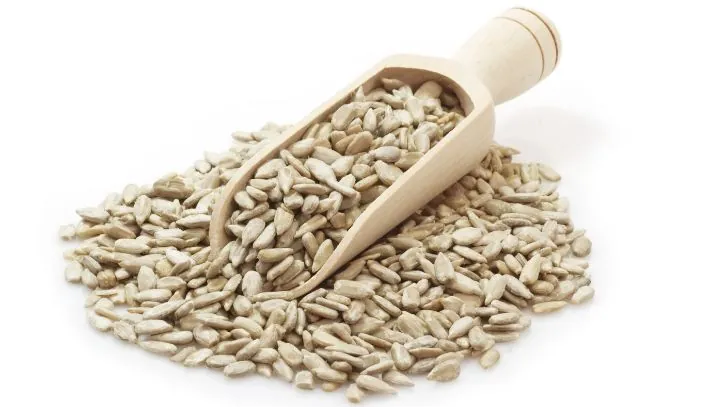Blog
Tiny But Mighty Sunflower Seeds!

Anytime my family went on a trip or went to livestock shows, we would always bring lots of bags of roasted sunflower seeds. I’m not sure how, but these quickly became one of my brother’s and my favorite snacks to take, and we were always divided on whethWhen I think back to my childhood, one of the snacks that always brings a wave of nostalgia is roasted sunflower seeds. These little powerhouses were a staple in our household, courtesy of my brother’s habit of bringing home bags in various flavors. It seems like just yesterday we were divided on which variety was the best—dill pickle, black pepper, or barbecue. Each flavor had its unique characteristics, tantalizing our taste buds and setting off friendly debates that often led to heated discussions.
But beyond the flavors and fun, what I’ve come to appreciate more about sunflower seeds is their impressive nutritional profile. Often underestimated due to their small size, these seeds are a treasure trove of essential vitamins and minerals, as highlighted by registered dietitian-nutritionist Rhyan Geiger. In addition to being a delightful snack, sunflower seeds provide numerous health benefits that make them a worthwhile addition to your diet.
Nutritional Profile of Sunflower Seeds
Sunflower seeds are tiny but mighty when it comes to their nutritional content. They are rich in:
- Protein: Essential for muscle repair and growth.
- Fiber: Aids digestion and supports gut health.
- Unsaturated Fats: Healthy fats that promote heart health.
- Vitamin E: A powerful antioxidant that protects cells.
- Iron: Crucial for transporting oxygen in the blood.
- Zinc: Supports the immune system and promotes wound healing.
- Selenium: Vital for thyroid health and antioxidant protection.
- Manganese, Magnesium, Copper, and B Vitamins: Each contributing to various bodily functions needed for health and wellness.
Sunflower seeds (Helianthus annuus) also contain healthy plant compounds such as flavonoids and tocopherols that promote overall health. Given their dense nutrient profile, it’s no wonder these little seeds have generated so much interest among health enthusiasts and nutritionists alike.

Health Benefits of Sunflower Seeds
So, what exactly does that impressive list of nutrients translate into when it comes to our health? Let’s delve into some of the top health benefits that sunflower seeds offer, as noted by experts in the field.
1. Better Heart Health
Sunflower seeds have gained recognition for their heart-healthy properties. They are cholesterol-free, which is significantly beneficial in maintaining healthy cholesterol levels. The presence of dietary fiber helps to reduce bad cholesterol (LDL) levels in the bloodstream. Furthermore, the unsaturated fats present in sunflower seeds, particularly linoleic acid, contribute to heart health by lowering inflammation and maintaining blood pressure levels.
Regular consumption of sunflower seeds has been linked to a reduced risk of heart disease, making them an excellent addition to a heart-healthy diet. Adding them to your meals can be a delicious way to promote cardiovascular wellness.
2. Supports Thyroid Health
Did you know that sunflower seeds are rich in selenium—a mineral essential for the proper functioning of the thyroid gland? Selenium plays a crucial role in the production of thyroid hormones. A deficiency in selenium can lead to thyroid disorders and even autoimmune conditions such as Hashimoto’s thyroiditis. Incorporating sunflower seeds into your diet can help maintain optimal selenium levels, particularly for those who may not consume adequate amounts from other dietary sources.
3. Enhances Metabolic Health
Sunflower seeds can be advantageous for metabolic health due to their rich composition of fiber, protein, and healthy fats. The combination of these nutrients helps to keep blood sugar levels stabilized by preventing spikes and crashes after meals. For individuals managing diabetes or aiming for metabolic balance, including sunflower seeds as a component of meals can support better glucose control.
Moreover, the fiber found in sunflower seeds aids in digestion. It promotes regular bowel movements and supports a healthy gut microbiome by acting as a prebiotic, feeding the beneficial bacteria in your intestines, which are critical for optimal health.
4. Strengthens Immune Function
Sunflower seeds are packed with antioxidants, including vitamin E, zinc, and selenium. These nutrients work synergistically to boost the immune system, enhancing the body’s ability to fight off illness and infection. Selenium, in particular, has been shown to improve the immune response, while vitamin E acts as a powerful antioxidant, protecting the body’s cells from oxidative stress which can lead to various diseases.
A robust immune system is essential for overall health, especially during cold and flu seasons. Regularly munching on sunflower seeds can contribute to your body’s defense mechanisms.
5. Promotes Digestive Health
The fiber content in sunflower seeds is abundant, consisting of both soluble and insoluble types. This makes them effective in promoting digestive health. Insoluble fiber adds bulk to the stool and aids in preventing constipation by facilitating movement through the digestive tract. In contrast, soluble fiber can help regulate blood sugar levels and lower cholesterol, contributing to overall gut health.
Incorporating sunflower seeds into your snacks or meals can help you meet your daily fiber needs, which many people often overlook. A healthy digestive system not only contributes to physical health but can also improve mood and mental clarity.
6. Supports Growth, Development, and Repair
Sunflower seeds are an excellent source of protein, which is essential for growth and repair of tissues in the body. This is particularly important for children, adolescents, and pregnant women. The combination of protein, zinc, and folate in sunflower seeds supports cell maintenance and the proper development of fetal tissues during pregnancy.
For those engaging in regular physical activity or muscle-building routines, sunflower seeds can be a great post-workout snack to aid muscle recovery due to their high protein content.
7. Enhances Skin Health
The healthy fats and vitamin E in sunflower seeds contribute to skin health by providing anti-inflammatory benefits and protection against UV damage. Vitamin E is known for its role in maintaining skin elasticity and hydration, potentially diminishing the appearance of wrinkles and fine lines. Additionally, the antioxidants found in these seeds help combat free radicals that can lead to skin aging.
If you’re looking for a tasty way to support healthy skin from the inside out, consider adding sunflower seeds to your diet. They can be incorporated into smoothies, trail mixes, or granola for a nutritious boost.
How to Incorporate Sunflower Seeds into Your Diet
Now that you are aware of the incredible benefits sunflower seeds offer, you might be wondering how to incorporate them into your everyday meals and snacks. Here are some versatile ways to enjoy these tiny powerhouses:
- Trail Mix: Combine sunflower seeds with nuts, dried fruits, and dark chocolate for an energizing and nutrient-packed snack.
- Salads: Sprinkle sunflower seeds atop salads for a delightful crunch and added nutrition.
- Baked Goods: Add sunflower seeds to muffins, breads, or granola bars for a nutritious kick.
- Smoothies: Blend sunflower seeds into your smoothies for added creaminess and protein.
- Sunflower Seed Butter: Swap out peanut or almond butter for sunflower seed butter; it’s delicious on toast or as a dip for fruits.
- Eat Them Straight from the Bag: As my brother and I did, enjoy them plain or flavored as a quick snack.
The Growing Popularity of Sunflowers
It’s fascinating to note that sunflowers thrive in places like Arizona, where the heat intensifies their growth. They not only provide nutritional benefits but also make for beautiful landscaping. This is something you might consider exploring at your local farmers’ market, where you can often find locally grown sunflower seeds or even sunflower seed butter. Supporting local farmers not only benefits the community but ensures you’re consuming quality products.
You can also adopt a sustainable approach by growing your own sunflowers in your garden. They are relatively easy to grow and can be a rewarding experience, bringing beauty and bounty to your home.
Conclusion
In summary, sunflower seeds are indeed tiny but mighty. Their impressive nutritional profile and wide range of health benefits make them an excellent addition to a balanced diet. From promoting heart and thyroid health to enhancing skin vitality, these seeds can significantly impact your overall well-being. Don’t overlook them in your snack choices or meal preparations. Consider their versatility and flavor potential, and experiment with various recipes and meal ideas.
For further reading and health-related articles, check out websites like Fill Your Plate, which explore the benefits of various foods and provide tips for healthy eating. Remember, investing in your health can be as simple as incorporating a handful of sunflower seeds into your day!
By prioritizing a holistic approach to nutrition, we can harness the power of foods like sunflower seeds to support our health and vitality. What’s your favorite way to enjoy sunflower seeds?
By Heide Kennedy, Arizona Farm Bureau Communications Intern


















